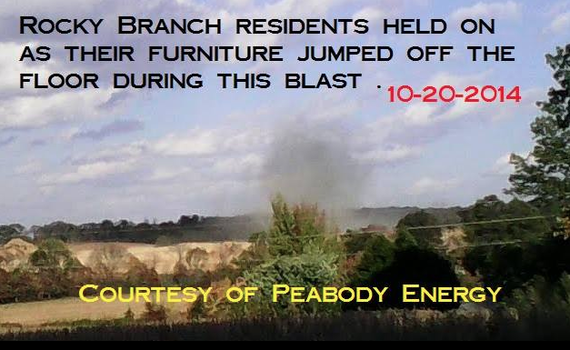
As the onslaught of the nation's fast-growing coal-mining boom tears across the heartland, citizens in southern Illinois have filed a Writ of Mandamus in Federal District Court against the US Secretary of Interior, in an attempt to revoke the state's control over its notoriously inept and rogue mining agencies.
The huge coal-mining rush in Illinois, against the grain of the nation's shift from coal and in defiance of climate action initiatives, might be the most under-reported environmental story in the nation. But the residents in southern and central Illinois, home of the massive expansion of longwall mines and strip mines, are holding the line against mounting coal slurry and mining damages.
"The goal of the Writ is to ensure Illinois citizens have a working coal program as required under Federal regulations," says Bob Johnson, with Citizens Opposing Pollution (COP). "We hope the Federal District Court agrees."
Meanwhile, in the small farming community of Rocky Branch in Saline County, elderly residents continued to document the pollution fallout and health and civil rights violations from nearby blasts by a controversial Peabody strip mine operation.
In a written statement released at the courthouse last week, Citizens Opposing Pollution (COP) claimed Illinois citizens are currently unable to ensure "compliance and clean up of coal slurry disposal sites in Illinois" due to a 2012 Illinois Supreme Court ruling. The group is requesting the Court to require Secretary Sally Jewell of the U.S. Department of the Interior to revoke Illinois' coal mining program. According to the COP statement:
"COP claims that precious Illinois underground fresh water resources underneath coal refuse sites are at stake. The group points to the Pearl Sand and the Trivoli Sandstone Aquifer, both located underneath a former coal mine owned by a division of ExxonMobil Coal USA. The Pearl Sand aquifer was the primary fresh water source for Clinton County residents until 2001. However, in 2001, it was determined that it was no longer safe for human consumption. The Illinois Environmental Protection Agency allowed ExxonMobil Coal USA to donate 1 million dollars to help set up an alternative public water supply for residents living above the Pearl Sand Aquifer instead of requiring clean-up of the site. To this day, the coal refuse, a sludge like material, continues to leach contaminants into the Pearl Sand Aquifer, making the groundwater unusable for human consumption."
"COP wants to ensure that if coal extraction continues to exist in Illinois," says Penni S. Livingston, attorney for COP, "that coal production operators abide by the rules; and if they are unable to do it, then they should reconsider whether coal production is really a profitable enterprise."

